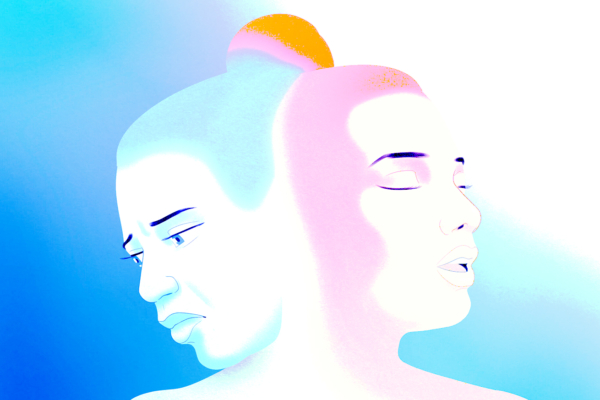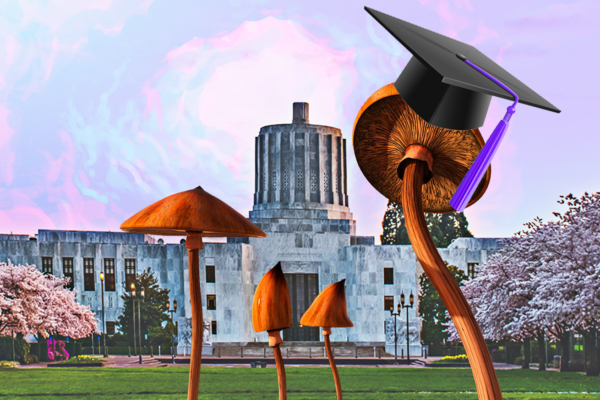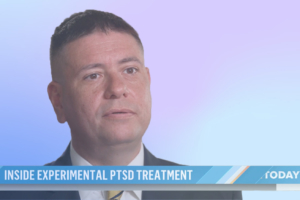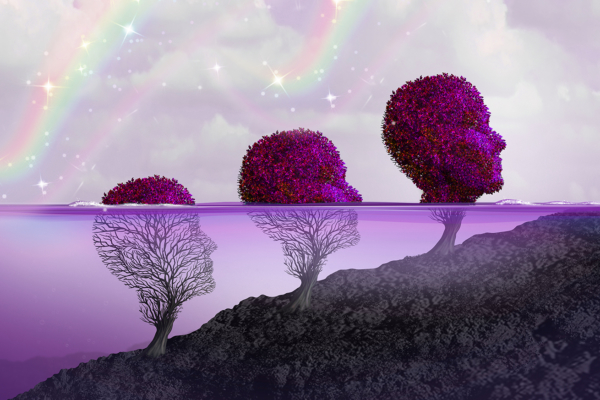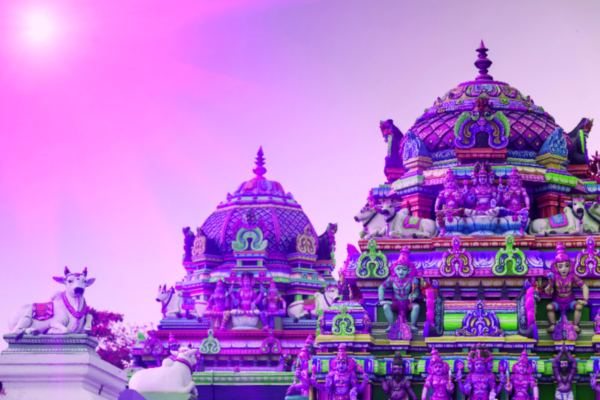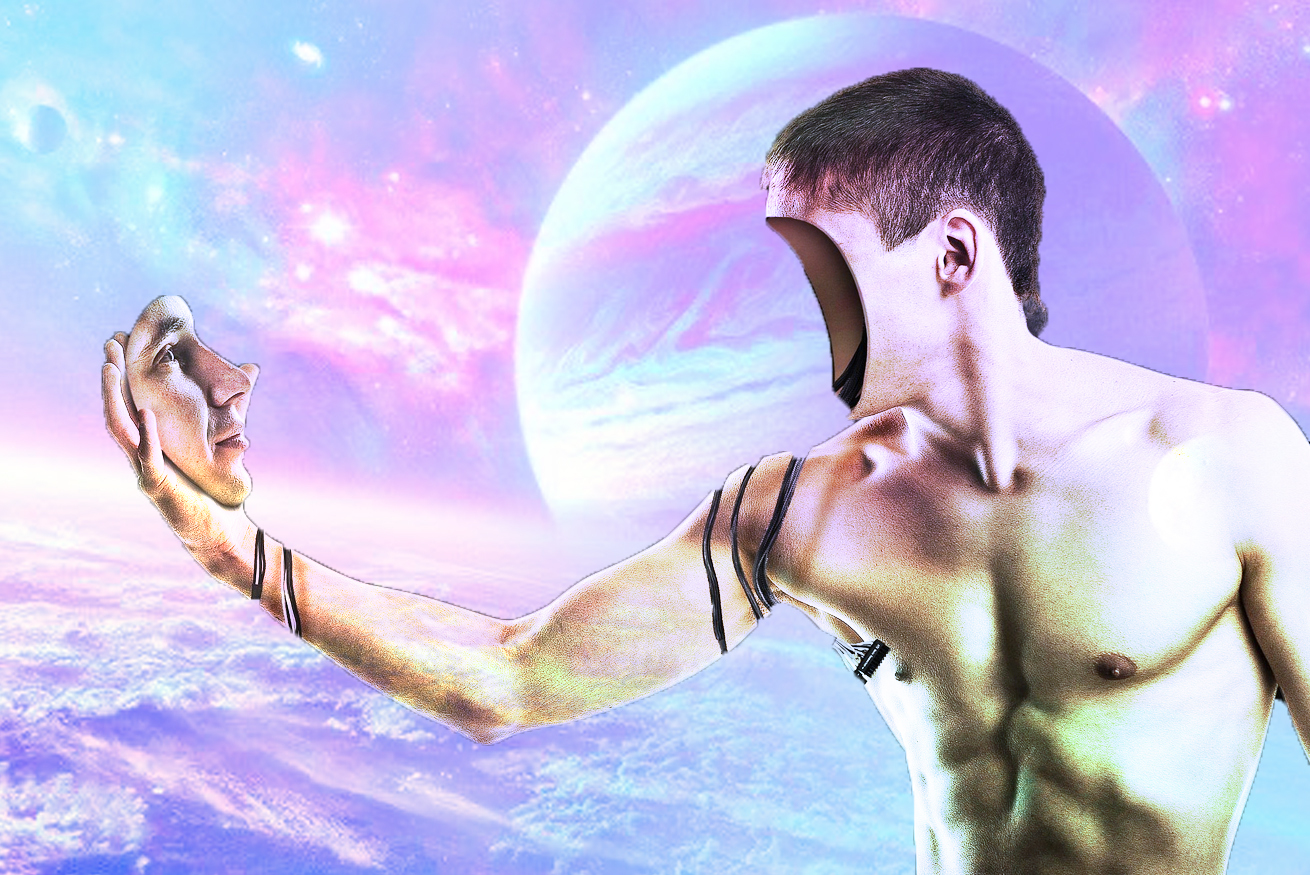
Imagine you wake up in your body but you have no idea who you are. Everything around you feels new. You can’t remember your name or any biographical information, and you are seeing the world without any bias or historical context. In the dimness of your mind you can remember that you are human, and you are standing on a planet spinning in space, but beyond that you are clueless. You have just entered ego death.
Ego death, or ego dissolution, is a term used in psychedelic and mystical communities to describe a temporary state of autobiographical amnesia, a psychological condition where you are fully awake and functional, yet cannot remember any information about yourself, even your name or your gender. Ego death is often described as feeling very light and pleasant, as if the weight of the biographical self had been lifted from the body. Alternately, depending on context, ego death can be extremely disorienting and terrifying.
What Does Ego Death Feel Like?
Imagine walking into a room and instantly forgetting what you walked in for, and you stand blankly waiting for some piece of information to pop into your mind and solve the puzzle. But then that moment stretches on for minutes, and you still have no clue how you got there, or what you were doing. If you find yourself in a state of temporary amnesia, you may have also forgotten how you came to be there, or how long it might last. Without knowing answers to any of these questions, the experience can become very frightening.
Some people experiencing ego death on psychedelics for the first time may believe that the state will last forever, and they will never return to their “old life”. This realization is often met with horror and panic, and is one of the primary causes of bad trips and freak outs. Some people may come to the conclusion that they have died and entered an entirely new world, hence the term “ego death”. But drug induced ego death is always temporary, and when you come out of it and begin to put the pieces of yourself back together, it can be a long and painful process. That’s why the practice of psychedelic integration is so important following ego death, and why the archetype of death and rebirth is central to psychedelic spirituality and healing.
How Does Ego Death Work?
In recent years, ego dissolution has become a hot topic of study in psychedelic therapy. Cases of autobiographical amnesia are usually related to unusual activity in the hippocampus, the area of the brain responsible for storing and retrieving memories, located in the medial temporal lobe. In the case of ego death, it is reasonable to assume that higher doses of psychedelics disrupt the information flow from the hippocampus to the executive areas in the forebrain responsible for working memory, causing autobiographical memory to become temporarily offline.
To quote a 2015 scanning study from Imperial College, ego dissolution under the effects of psilocybin was found to be associated with “decreased functional connectivity between the medial temporal lobe and high-level cortical regions.” Also, “individuals with lower diversity of executive network nodes were more likely to experience ego-dissolution under psilocybin.” Both of these findings suggest that the communication of biographical information from the hippocampus to the executive areas of the forebrain is severely diminished during ego death.
How Long Does It Last?
The state of ego death can last as long as a few minutes to a few hours, depending on the dose and type of psychedelic. Ego death is most commonly reported on longer lasting psychedelic drugs like psilocybin and LSD. Short-duration drugs like vaporized DMT may produce an intense state of ego death lasting only a minute or two, dropping the user into a disoriented state with unsettling questions like, “Who am I?” and “What just happened?”
When the state of ego death begins to wane, autobiographical memories may begin pouring back into consciousness, giving the user the experience that their life is “flashing before their eyes,” a trait commonly reported in near death experiences. This experience of metaphorically dying and being reborn is widely considered to be one of the most profound aspects of the psychedelic experience.
Is Ego Death a Mystical State?
Although ego death shares similarities with other well known mystical states, in many ways it is wholly unique to the psychedelic experience. The term ego, which broadly means one’s sense of self, wasn’t popularized until the turn of the 19th century, when Sigmund Freud made it a central part of his theory of psychoanalysis. The term ego death or ego dissolution wasn’t popularized until 1964, when Timothy Leary used it to describe the mystical effects of LSD. Even though psychedelic advocates naturally compared the psychedelic state to other mystical states like enlightenment, samadhi, or satori, those terms all have common definitions intrinsically tied to ancient mystical traditions. In clinical terms, ego death is more like a fugue state, reverie, amnesia, senility, or dementia —an episode that may be phenomenally similar to a mystical state but is otherwise lacking in spiritual context.
In the proper set and setting it can certainly feel like a mystical experience. If you find yourself in a natural setting exploring the wonders of the world with fresh eyes, you will experience everything as new and beautiful with no boundaries between yourself and the rest of creation. If you are in a shamanic setting, you may experience a sense of timelessness or infinity that feels like it can last an eternity. These states are often described with feelings of openness and connection or oneness with all things, and a sense of awe at the unfathomable size and mystery of the universe.
Is Ego Death Good for Me?
In a 2018 study of ayahuasca drinkers, researchers measured the levels of ego dissolution experienced by each subject using an ego dissolution questionnaire, and then measured short term and long term changes in their mood and behavior. The study found that “ratings of depression and stress significantly decreased… convergent thinking improved…” and, “Changes in affect, satisfaction with life, and mindfulness were significantly correlated to the level of ego dissolution experienced during the ayahuasca ceremony.” These results suggest that ego dissolution may be an essential component of psychedelic therapy, though this is still a subject of some debate.
In recent years, on some corners of the internet, the concept of ego death has been popularized as a kind of achievement to be unlocked for “leveling up” in mystical or psychonautical practice. The general sentiment seems to be that if you experience ego death, you will become a more humbled, thoughtful, and wiser person with fewer emotional attachments. However, there is no evidence this is true. In fact, some people in the psychedelic community feel the term “ego death” may be a misnomer because even though the ego temporarily dies, when it comes back, it comes back stronger.
Recent research has shown some paradoxical and counterintuitive effects of spiritual practice on the sense of self. One potential unintended consequence of a hyperfocus on self-improvement through spiritual training is elevated levels of narcissism and spiritual superiority. Instead of ego death leading to a state of openness and compassion, it may lead to heightened levels of superiority and ego inflation. So even though the mystical effects of ego death are undeniable, there’s no guarantee that it is a shortcut to becoming a more thoughtful person. Because of this, It would be a mistake to frame the experience of ego death as an achievement that leads to a more rounded sense of self. After all, an obsession with ego death is still an obsession with the ego.
